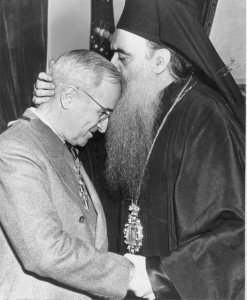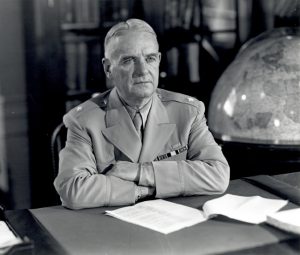It’s long been an open secret that Patriarch Athenagoras’ election as Ecumenical Patriarch was arranged, or at least facilitated, by the United States government. It’s difficult to write about this as an historian, though, because smoking guns for that kind of thing tend to be kept under wraps. Occasionally, though, something slips out. I was recently paging through old documents on the CIA database that were released under the Freedom of Information Act (FOIA). One file contains a big batch of papers from CIA’s predecessor agency, the OSS, all focused on Greece during World War II. Buried in the nearly 300 pages of that PDF are several items pertaining to Athenagoras, who at the time was Archbishop of the Greek Archdiocese of North and South America.
In an OSS interoffice memo dated March 26, 1942, an intelligence agent named Ulius L. Amoss wrote this to a fellow OSS agent named David Burns:
The Archbishop was extremely pleased at having met and lunched with you. He has told me that the entire facilities of his organization are at our disposal. He put it in these words:
“I have three Bishops, three hundred priests and a large and far flung organization. Every one under my order is under yours. You may command them for any service you require. There will be no questions asked and your directions will be executed faithfully. Please tell Mr. Burns for me that this is so.”
A month later, on April 25, the 56-year-old Greek Archbishop attempted to enlist in the U.S. Army. He was turned down.
A few weeks after that, on May 14, Ulias Amoss, the same intelligence agent who wrote the March 26 memorandum, wrote a letter to Athenagoras, thanking him for the Greek Archdiocese’s ongoing cooperation, saying, in part, “The care with which your Bishops and Priests have cooperated has impressed everyone and the report that, perhaps, as many as a hundred thousand names will be returned to us is astounding.” On the same day, William J. Donovan himself — the head of the OSS — also wrote to Athenagoras, “The reports and descriptions of Greek-American youth of military age so kindly undertaken by you are coming in in splendid volume. The care with which Your Grace has managed this important service is of great interest to our armed services and I wish to express my deep appreciation for your loyal and patriotic assistance.”
Donovan then apparently went out of town, so Athenagoras waited to reply until July 16. Here’s the full text of the Archbishop’s letter:
My dear Mr. Donovan:
I received your cordial letter of May 15th, but upon learning that in the meantime you had departed, I waited until you return to write to you.
I welcome you and thank you from the bottom of my heart for your letter and its contents. You have obligated me very much, because I think I don’t do very much for the U.S., to whom I am deeply indebted.
I am ready though to submit myself to any duty and to make every possible sacrifice for our beloved Country, which is fighting for Universal freedom and justice and for the New Day which is to come.
I was in Washington a few days ago, and would have come to see you if I hadn’t been called back to N.Y. Rest assured though, that at my first opportunity I shall come to Washington to meet you personally, and express my sincere admiration toward you.
Sincerely yours,
Archbishop Athenagoras
It’s pretty amazing that these documents are public, as they represent the beginnings of the fairly well-known but not well-documented relationship between Archbishop Athenagoras and US intelligence officials. In 1942, Athenagoras proved himself a reliable ally of the U.S. government, and while his wartime patriotism is not necessarily unusual, his language is almost shockingly strong: “There will be no questions asked and your directions will be executed faithfully.”
In the years that followed, Archbishop Athenagoras remained a valuable resource for US intelligence. An OSS report prepared sometime after December 31, 1944, lists Athenagoras among its key contacts. This OSS report comments, “The State Department and other executive agencies can hardly cultivate contacts of this sort freely without putting an official cachet on the individuals in question and inviting criticism from politically hostile quarters. It has been possible for the Foreign Nationalities Branch [of the OSS], however, to talk intimately and as frequently as needed with such men.” The list of “such men” includes not only Athenagoras but also the Albanian Bishop Fan Noli and the Serbian Bishop Dionisije Milivojevich.
The relationship between Athenagoras and the US government proved to be mutually beneficial. When Athenagoras was elected Ecumenical Patriarch in late 1948, he was flown to Istanbul on President Truman’s presidential plane (which was named, bizarrely, the “Sacred Cow”). From his new post at the Phanar, Athenagoras served as a pro-American counterweight to the pro-Soviet Moscow Patriarchate. But that is a story for another day.


Are you aware of the “Greek Battalion” branch of the OSS that parachuted into Greece and fought with the Andartes? My uncle was the battalion dr and jumped with them six times. Great bunch of Greek A Mexican boys. Fascinating story.
Yes, Jim. The story of the Greek Battalion is little known today. The article posted here has been republished in Greek numerous time, with the insinuation that Archbishop Athenagoras was some traitor working for the O.S.S. They neglect to put his correspondence in context — that he assisted in the raising of a volunteer militia to be flown to occupied Greece to fight in the resistance. That’s heroic and patriotic by any standard. The AHEPA’s Supreme President was touring Greek American communities to sell war bonds and in the process recruited volunteers for the Greek Irregular Project under the supervision of Ulius L. Amoss. Before joining the O.S.S., Amoss was the head of the YMCA in Greece where he helped millions of refugees. My friend, everything must be put in context otherwise the propagandists will prey on half truths and ignorance.
Interesting. They got rid of his predecessor Maximos V because some thought he was pro communist. He lived out his life in Switzerland. We don’t hear much about this.
Maybe it is time for Bartholemew to retire.
…”New Day” interesting revelation!
This information is well known but it is useful to repeat it because it sheds light on the dramatic contemporary events concerning the Ukrainian Church. Your site is very interesting. Will you allow me to translate it into French and reproduce it on my orthodox blog? Of course by faithfully quoting the sources.
Thank you, Maxime. You’re welcome to translate into French for your blog. Thanks for asking!
I thank you for your trust Matthew
Archbishop Athenagoras never imagined that his unconditional surrender would soon result in Greece’s banana republic status, the catastrophic civil war in 1946 and a backward dictatorship in 1967, from which Greece still has not recovered.
Peter, please read my note above. Athenagoras did not “surrender” to the O.S.S. Instead, he cooperated with the O.S.S. in raising a militia of Greek American volunteers to be parachuted behind enemy lines in occupied Greece to join the resistance. This is not “surrender” but a heroic act. Furthermore, the Greek Irregular Project was started before the Pearl Harbor attack that brought the U.S. directly into the war. Roosevelt and his personal friend, Ulius L. Amoss, helped the Greek resistance movement and the exiled Greek government both with a Lend Lease program and the clandestine material assistance. Athenagoras got to know Ulius L. Amoss while he was a young bishop in Corfu and Amoss instituted a YMCA program in his diocese.
Both men knew that Greece’s place in the post-war world order had to be with the democratic West and both worked toward that goal. I only wish Greece’s Balkan neighbors had an Athenagoras and an Amoss looking out for their interest. (I could provide many more pertinent facts about both men, but space limitations prevent me.) NICE BLOG.
Hey Andy. Why did Athenagoras use such strong language and appears to be submissive? First, Amoss’s quote of Athenagoras is most likely exaggerated. It would not be the first time Amoss exaggerated. (He was also blamed for exaggerating his intelligence assessments from the Greek resistance in the Peloponnese). Nonetheless, Athenagoras did offer his unconditional assistance to the OSS and the question must be asked why he did so. I think it’s because the OSS Greek Irregular Project, the program to recruit and train militias of Greek American volunteers from the Archdiocese’s parishes, was absolutely clandestine. The U.S. was not officially in the war yet and if it admitted sending troops into occupied Greece it would be an act of war against Germany. The OSS-trained militia was nominally a private venture that was put under the orders of the Greek government in exile, headed by Prime Minister Emmanuel Tsaldaris and King George II. Another point: It is wrong to conclude that Athenagoras was deeply involved in the American secret services in any way whatsoever. He knew Ulius L. Amoss personally for over two decades, long before there was an OSS or even the Coordinator of Information. They were personal friends in Greece since 1920, where Amoss headed the YMCA and Athenagoras was a young bishop. His amazing work during the interwar years, during Greece’s “Great Catastrophe,” included assisting the Church’s mission in its humanitarian efforts resettling refugees, and by setting up Bible study classes, English classes, business schools, summer camps, and all kinds of athletics that kept Greece’s youth close to the church and off the streets and cafes — the usual places where fascists and communists recruited and radicalized youths all over Europe. The OSS documents, which have been declassified for a while now, confirm that Athenagoras was indeed a man of vision and action. He made sure that his flock lived in freedom, just like he saved his church in America from both political and canonical divisions. His struggles with Albanian bishop Fan Noli — presented in the documents as another OSS collaborator — are well-documented. Fan Noli not only spread seeds of discord in the church, he even named himself prime minister of Albania. With the passage of time we don’t have to speculate who achieved the best outcomes for their respective flock.
I saw that reference to the draft card filled out by then Archbishop Athenagoras also on the Russian backed orthochristian website as a supposed “proof” they he tried to join the military himself. It is simply a registration card required by Selective Training and Service Act of 1940, also known as the Burke–Wadsworth Act, to be filled out by any man residing in the US and born between the dates listed on the top of the card. He was 56 years old at the time and would not be required to serve. It is factually incorrect and possibly disingenuous to present a draft card as an “attempt to join the military and was turned down”. He was over 45 years of age so would be exempt from service, and also could exempt himself for religious reasons.
This is all fascinating. I teach a module on the religious dimension of the Cold War and would, with your permission, like to include a selection of your articles, especially those examining Athenagoras, in my module guide.
Sorry for the late reply. Please feel free to use my work in your class.
Thank you.